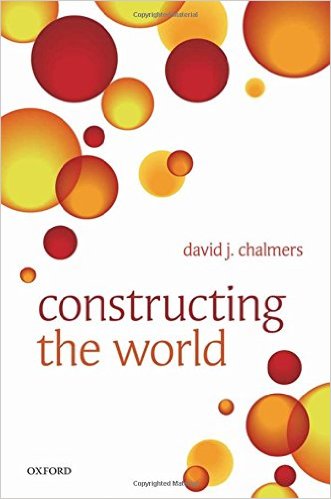constructing the world
Publisher’s blurb

David J. Chalmers constructs a highly ambitious and original picture of the world, from a few basic elements. He develops and extends Rudolf Carnap’s attempt to do the same in Der Logische Aufbau Der Welt (1928). Carnap gave a blueprint for describing the entire world using a limited vocabulary, so that all truths about the world could be derived from that description–but his Aufbau is often seen as a noble failure. In Constructing the World, Chalmers argues that something like the Aufbau project can succeed. With the right vocabulary and the right derivation relation, we can indeed construct the world.
The focal point of Chalmers’s project is scrutability: roughly, the thesis that ideal reasoning from a limited class of basic truths yields all truths about the world. Chalmers first argues for the scrutability thesis and then considers how small the base can be. All this can be seen as a project in metaphysical epistemology: epistemology in service of a global picture of the world and of our conception thereof.
The scrutability framework has ramifications throughout philosophy. Using it, Chalmers defends a broadly Fregean approach to meaning, argues for an internalist approach to the contents of thought, and rebuts W. V. Quine’s arguments against the analytic and the a priori. He also uses scrutability to analyze the unity of science, to defend a conceptual approach to metaphysics, and to mount a structuralist response to skepticism. Based on Chalmers’s 2010 John Locke lectures, Constructing the World opens up debate on central areas of philosophy including philosophy of language, consciousness, knowledge, and reality. This major work by a leading philosopher will appeal to philosophers in all areas.
Table of Contents
1. Scrutability and the Aufbau
- First Excursus: Scrutability and Knowability
- Second Excursus: The Inscrutability of Reference and the Scrutability of Truth
2. Varieties of Scrutability
- Third Excursus: Sentential and Propositional Scrutability
- Fourth Excursus: Warrants and Support Structures
- Fifth Excursus: Insulated Idealization and the Problem of Self-Doubt
3. Adventures with a Cosmoscope
- Sixth Excursus: Totality Truths and Indexical Truths
4. The Case for A Priori Scrutability
- Seventh Excursus: Varieties of Apriority
- Eighth Excursus: Recent Challenges to the A Priori
5. Revisability and Conceptual Change
- Ninth Excursus: Scrutability and Conceptual Dynamics
- Tenth Excursus: Constructing Epistemic Space
- Eleventh Excursus: Constructing Fregean Senses
6. Hard Cases
- Twelfth Excursus: Scrutability and the Unity of Science
7. Minimizing the Base
- Thirteenth Excursus: From the Aufbau to the Canberra Plan
- Fourteenth Excursus: Epistemic Rigidity and Super-Rigidity
8. The Structure of the World
- Summation: Whither the Aufbau?
- Fifteenth Excursus: The Structuralist Response to Skepticism
- Sixteenth Excursus: Scrutability, Supervenience, and Grounding.
- Seventeenth Excursus: Explaining Scrutability
Bibliography